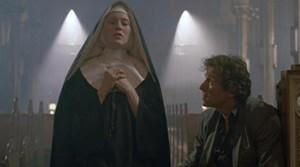
Bad Lieutenant (Abel Ferrara, 1992)
Director Abel Ferrara doesn't afford Harvey Keitel's character a name. He is merely called the lieutenant, a denomination that discusses the character's limited humanity. We are clearly made aware of his position. He is a ranking cop in New York City. The film opens with the lieutenant bringing his two sons to school; we become aware that he is also a family man. Yet these positions in society are mere afterthoughts as Ferrara is more interested in what makes this character special --- his hourly trespasses, his obvious contradictions, his unlikely story of redemption.
Right after bringing his kids to school, he sniffs some cocaine while listening to the radio about the Mets-Dodgers game. He bets an ungodly amount for the Dodgers; his stab at luck betrays him as the Mets inch their way slowly from a winless season to championship. He regularly visits a whore (Zoë Lund) whom he engages in different kinds of illegal drug treatments. He drinks while driving; he smashes his radio out of mere wrath; he consorts with prostitutes in sado-masochistic positions; he sneaks away illegal drugs from crime scenes and sells them to a Latino drug dealer; he blasphemes; he uses his positions to force sexual favors from lady trespassers.
In one scene, the lieutenant stands naked, howls pathetically with his arms outstretched (with no one to return the embracing gesture). The entire film tracks the lieutenant in all his vulnerable inglory as every capital sin is committed, as he marathons his way out of human virtue and rational forgiveness. Ferrara polarizes us, gets us angry and disgusted, before convincing us that he hasn't fallen so far out from grace to be irredeemable.
Aside from the spree sinning, the film explores the case of a nun (Frankie Thorn) who was raped by two Latino gangbangers. The rape itself is a thing of complete depravity. The statue of Mother Mary is pushed down the ground while the nun is perversely invaded by both malefactors; the crucifix used as an object of rape; the holy altar as the exact spot of the crime. In the lieutenant's mind, the case represents a way out of his ballooning debts to the gambling shark as a fifty thousand dollar reward is attached to the solution of the case. The lieutenant is faced with two options of redemption; an earthly one that keeps him attached to mortal pleasures and threats, and one which he realizes from an abrupt chat with the rape victim, a spiritual redemption that requires a harsh sacrifice.
Ferrara examines the dilemma of redemption under the most difficult of scenarios. Keitel portrays the lieutenant unforgivingly. The two merely give slight glimpses of humanity to the character, furthering the difficulty of accepting the conclusive redemption in the film. The cries and whimpers are almost inhuman in aural tone. Ferrara's depictions of the lieutenant's family life are mere traces of how far he has fallen. It's a dizzying spiral downfall by a man who has already fallen so far from grace; it's amazing how much more depravity he can commit to the point that the fantastic turnaround (Jesus Christ makes an appearance in a city depicted as modern Babylon --- mostly out of the lieutenant's drug-afflicted mixture of guilt, Catholic upbringing, and wild imagination) becomes a relatively unpalatable reward.
Ferrara has made a film of astounding depth and observant quality. It is unflinching in portrayal of humanity in its lowest yet despite that fact, it's a film that is interestingly religious (or Catholic, depending on your religious denomination). It's a film, with all its sleaze, violence, and celluloid-printed grease, that is more soul-affectingly powerful than Mel Gibson's Christ film. Each of the lieutenant's plentiful trespasses against morality bears a greater ache to the collective Catholicism than the rapid bloody whippings the cinematic Christ Gibson has created. The lieutenant's poignant yet open-ended redemption more uplifting and affecting than that final shot in Gibson's flick.







wm.jpg)


























.png)




1 comment:
can u tell me what does the latino drug dealers mother give Keitel when he goes to pick up the money for the coke?
is it more coke or some kind of medecine.
Post a Comment